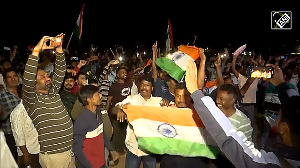The United States will retain its position as the only super power or Pax Americana till 2020 but it will have to accommodate rising economic powers such as India, China, Indonesia, Brazil and others under the new global order, a top American strategist has said.
The US has managed to use its post-Cold War preeminence to patch together, with difficulty, a new global order where Washington is the key driver, yet it is not the American-dominated system some hoped and others feared it might be, L Hutchings, chairman of the National Intelligence Council which reports to the US Central Intelligence Agency, said at a World Affairs Council seminar.
Although unipolar in form, Hutchings said, the system in fact is a multilateral enterprise in which American power is even more constrained than it was during the Cold War.
The global trading and financial system under Pax Americana, he said, is more heterogeneous, "reflecting the numerous deals cut to accommodate and integrate China, India, Indonesia, Brazil and other rising economic powers -- by allowing them to continue following looser labour, regulatory and environmental standards."
"They are in, but the international economy is less efficient and less beneficial to the US," he said at the seminar on 'Looking over the horizon: Assessing America's strategic challenges'.
Hutchings said the international system writ large is a loose one, with regional powers and organisations playing larger roles and US playing the role of external balancer.
"Other states are free to pursue their own interests and get to be security free-riders, while the United States voluntarily sacrifices some of its particular interests for the sake of 'the system' and its nominal leadership thereof," he claimed.
He said the threats the US faces are dispersed and global and grow out of complex cultural roots. To tackle this the breadth and depth of the intelligence coverage has to be correspondingly greater and on such issues, "we must look outside the government to find the expertise on which we must draw."
He said the US faces a major flux in all areas around the world it has traditionally considered vital -- US-European relations, East Asia, the Middle East -- and it is simultaneously waging a global struggle against terrorism which can take it into countries and regions traditionally low on its list of priorities.
The "drivers" that will shape the world of 2020 include Japan, Russia and most of Europe will be coping with aging populations, unfunded pension systems, stressed social welfare systems and shrinking work forces.
This is likely to mean slower growth or no growth for these economies, and for Europe, the influx of large new Muslim populations to fill gaps in the work forces, he said in his analysis.
In the Davos-World, i.e. the world envisioned by the elites of the annual World Economic Forum in Davos, Switzerland, rising economic powers led by China and India find that they can play -- and prosper -- within the existing rules of the global trading system, Hutchings said.
Unlike the previous scenario, they play by the rules, and learn to play very well indeed. They do not gain a commensurate share of political power in this system -- they do
not get to set the rules of the global trading system for example -- but are willing to bide their time so long as the economic returns are high. The Chinese economy is poised to overtake the US as the world's largest economy by 2020.
Technological innovation is unpredictable by definition, but in information and biotechnology, scientific innovation will continue to accelerate, he said.
The rise of Islam is likely to be a factor in 2020, owing to youth bulges in several Arab countries, unemployment and the effects of religious education.
Some "rogue" states and terrorist organisations will seek to offset their relative weakness against American preeminence by waging "asymmetric warfare" via insurgencies, jihads and pursuit of weapons of mass destruction, he said in his analysis.
In the Middle East, the social contract in several countries will surely break down, leading to liberalising change in some and radicalism in others. Iraq's future evolution is obviously a major determinant. Arab-Israeli peace is the positive wild card to consider, he said.






 © 2025
© 2025